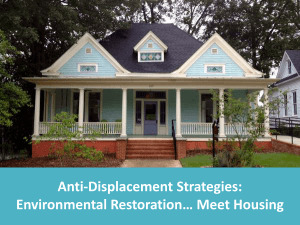Essential Learning Series: Gentrification and Anti-Displacement
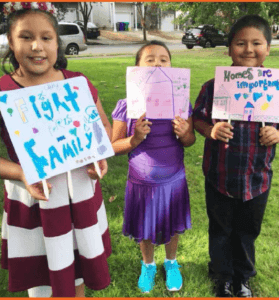
Photo via PolicyLink
Since 2019, River Network and the Urban Waters Learning Network (UWLN) have been digging deeper into a topic that has long been a concern of UWLN members: the gentrification and displacement of people that we see taking place in our urban communities, oftentimes following efforts to revitalize and reinvest in the places we call home.
We are addressing these topics by surveying our network members and producing blog posts, webinars, impact stories, and other resources. Check out the recorded trainings and additional resources below.
Related Resources:
UWLN Equitable Development and Anti-Displacement Collaborative, a cohort of six urban waters leaders that listen, learn, and grow the body of research pertaining to equitable development in environmental spaces.
Right to the City, a national coalition that advocates against displacement of BIPOC and low income community members and for affordable housing.
Equitable Development 101 – A 3-Part Webinar Series
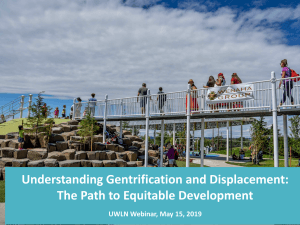 Understanding Gentrification and Displacement – The Path to Equitable Development
Understanding Gentrification and Displacement – The Path to Equitable Development
This recorded webinar frames the topics of gentrification and displacement and provides an example of the types of multi-sector partnerships that urban waters practitioners can create to ease displacement pressures. Presenters Paulina Lopez and Robin Schwartz from the Duwamish River Cleanup Coalition/TAG (Seattle, WA) share why this is an issue of concern and is one they are paying increasing attention to as a river-focused organization. Chris Schildt from PolicyLink addresses the drivers behind displacement, how gentrification and displacement are related and different, and policies and/or practices that can be enabled to ease displacement pressures. Exploring these topics further, Tony Defalco from Verde shares information about a multi-sector partnership called Living Cully. In the Cully neighborhood of Portland, Living Cully partners strive to balance environmental investments, equitable development, and anti-displacement goals.
> Watch here or download as PDF.
Monitoring Neighborhood Change – Using Data to Track and Prevent Displacement
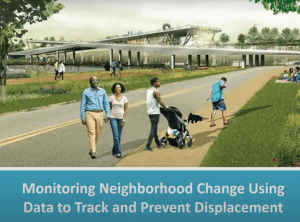 In this recorded webinar, the second in our Urban Waters Learning Network series on gentrification and displacement, we explore different ways data is being used by communities and decision-makers to understand displacement vulnerabilities, inform infrastructure investments and policies, predict areas at risk of gentrification and displacement, and assess equitable development plans.
In this recorded webinar, the second in our Urban Waters Learning Network series on gentrification and displacement, we explore different ways data is being used by communities and decision-makers to understand displacement vulnerabilities, inform infrastructure investments and policies, predict areas at risk of gentrification and displacement, and assess equitable development plans.
>Watch here or download as PDF.
Anti-Displacement Strategies: Environmental Restoration… Meet Affordable Housing
Building on the first 2 webinars in our series on gentrification and displacement that (1) defined the issues and (2) showed how to use data to track them, this webinar focuses on the most effective strategy to preventing displacement: protecting and expanding affordable housing.
> Watch here or download as PDF.
Equitable Development 201 – Webinar Series
Building Community Leadership as an Anti-Displacement Strategy
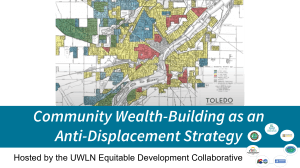 This recorded session examines the crucial role of advancing community education and building leadership to the development of anti-displacement strategies like preserving affordable housing and instituting other policies that keep communities in place. This panel-style discussion was moderated by two members of the Urban Waters Learning Network Equitable Development Collaborative – Arthur Johnson (Lower Ninth Ward Center for Sustainable Engagement and Development) and Liz Balladares (Passaic River Urban Waters Federal Partnership). Learn how community members in Newark, NJ and Houston, TX have advanced anti-displacement initiatives and equitable development policies from presenters Daniel Wiley of Ironbound Community Corporation (Newark, NJ) and Iris Gonzalez, Coalition of Environment Equity and Resilience or CEER (Houston, TX). Finally, Kate Derickson, with the CREATE Initiative, University of Minnesota, shares the Policy Toolkit: Sharing in the Benefits of a Greening City.
This recorded session examines the crucial role of advancing community education and building leadership to the development of anti-displacement strategies like preserving affordable housing and instituting other policies that keep communities in place. This panel-style discussion was moderated by two members of the Urban Waters Learning Network Equitable Development Collaborative – Arthur Johnson (Lower Ninth Ward Center for Sustainable Engagement and Development) and Liz Balladares (Passaic River Urban Waters Federal Partnership). Learn how community members in Newark, NJ and Houston, TX have advanced anti-displacement initiatives and equitable development policies from presenters Daniel Wiley of Ironbound Community Corporation (Newark, NJ) and Iris Gonzalez, Coalition of Environment Equity and Resilience or CEER (Houston, TX). Finally, Kate Derickson, with the CREATE Initiative, University of Minnesota, shares the Policy Toolkit: Sharing in the Benefits of a Greening City.
> Watch here or download as a PDF.
Community Wealth-Building as an Anti-Displacement Strategy
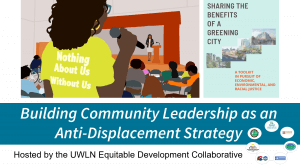 This recorded session examines the importance of building community wealth to help people stay in place and to advance equitable development initiatives. This panel-style discussion was moderated by members of the Urban Waters Learning Network Equitable Development Collaborative Arthur Johnson (Lower Ninth Ward Center for Sustainable Engagement and Development) and Alicia Smith (Junction Coalition). Presenters: Janet Hales (Advocates for Basic Legal Equality) and Kattie Bond-Hancock (Lucas Metropolitan Housing).
This recorded session examines the importance of building community wealth to help people stay in place and to advance equitable development initiatives. This panel-style discussion was moderated by members of the Urban Waters Learning Network Equitable Development Collaborative Arthur Johnson (Lower Ninth Ward Center for Sustainable Engagement and Development) and Alicia Smith (Junction Coalition). Presenters: Janet Hales (Advocates for Basic Legal Equality) and Kattie Bond-Hancock (Lucas Metropolitan Housing).
> Watch here.
Community Partnerships and Action to Fight Displacement
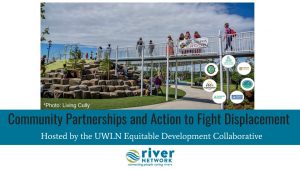 Watch this recorded session about community partnerships and actions to fight displacement which includes expert speakers–Cameron Herrington and Mayra Torres–from Living Cully, a multi-organization partnership based in Portland, OR. The speakers share information about the partnership as well as actions to preserve affordable housing and a proposed “Community-Led Development District” which aims to create a Tax Increment Financing (TIF) district in Portland’s Cully neighborhood to fund community-led projects. The peer call also includes a discussion between members of the Urban Waters Learning Network Equitable Development Collaborative and our speakers. Moderators: Arthur Johnson (Lower Ninth Ward Center for Sustainable Engagement and Development) and Lubna Ahmed (Groundwork Denver)
Watch this recorded session about community partnerships and actions to fight displacement which includes expert speakers–Cameron Herrington and Mayra Torres–from Living Cully, a multi-organization partnership based in Portland, OR. The speakers share information about the partnership as well as actions to preserve affordable housing and a proposed “Community-Led Development District” which aims to create a Tax Increment Financing (TIF) district in Portland’s Cully neighborhood to fund community-led projects. The peer call also includes a discussion between members of the Urban Waters Learning Network Equitable Development Collaborative and our speakers. Moderators: Arthur Johnson (Lower Ninth Ward Center for Sustainable Engagement and Development) and Lubna Ahmed (Groundwork Denver)
> Watch here or download as a PDF.
Policy Opportunities at the Intersection of Community Development and Urban Waters
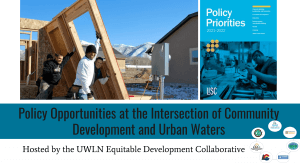 On Dec 9, 2021 the UWLN Equitable Development Collaborative hosted a peer exchange with representatives from Local Initiatives Support Corporation’s (LISC) policy team to share emerging policy opportunities at the federal level to promote affordable housing, economic development, and workforce development. LISC is a national community development organization that drives policy changes and targets investments to catalyze economic, health and safety for individuals and communities. LISC has a network of local offices in 38 cities and works in hundreds of urban communities across the U.S. Moderated by Gloria McNair (Groundwork Jacksonville); Presenters: Mark Kudlowitz and Michelle Harati (LISC’s Policy Team)
On Dec 9, 2021 the UWLN Equitable Development Collaborative hosted a peer exchange with representatives from Local Initiatives Support Corporation’s (LISC) policy team to share emerging policy opportunities at the federal level to promote affordable housing, economic development, and workforce development. LISC is a national community development organization that drives policy changes and targets investments to catalyze economic, health and safety for individuals and communities. LISC has a network of local offices in 38 cities and works in hundreds of urban communities across the U.S. Moderated by Gloria McNair (Groundwork Jacksonville); Presenters: Mark Kudlowitz and Michelle Harati (LISC’s Policy Team)
> Watch here or download as a PDF.
Additional Resources
See the UWLN Equitable Development Resources list for more.
Planning Documents
- The Junction-McClinton Nunn Choice Neighborhood Plan
- The Junction Neighborhood Master Plan (Toledo, Ohio)
- 11th Street Bridge Park – Equitable Development Plan by the 11th Street Bridge Park Equitable Development Task Force
Toolkits
- CREATE’s Sharing in the Benefits of a Greening City Toolkit
- What About Housing: A Policy Toolkit for Inclusive Growth by Grounded Solutions Network
- All-In Cities Policy Toolkit from PolicyLink
Anti-Displacement Strategies
- Not in Cully: Anti-Displacement Strategies for the Cully Neighborhood by Portland State University
- Community Land Trusts and Community Development: Partners Against Displacement by Local Initiatives Support Coalition
- Pathway to Parks & Affordable Housing Joint Development by LA THRIVES and Los Angeles Regional Open Space and Affordable Housing Coalition\
- Newark’s Rent Control Ordinance
- Newark’s Right to Counsel for Evictions Ordinance and initiative
- Greening Without Gentrification by the UCLA Institute of Environment and Sustainability and the University of Utah
- Inclusionary Zoning – What Does the Research Tell Us about the Effectiveness of Local Action?, an Urban Institute article
- Newark’s Inclusionary Zoning Ordinance
- Our Homes, Our Future report by PolicyLink
- Guide to Measuring Neighborhood Change to Understand and Prevent Displacement by the National Neighborhood Indicators Partnership
Other Resources
- Redlining (HOLC) maps and associated notes for communities across the U.S.
- Equitable Development and Urban Park Space by the Urban Institute
- Transformative Climate Adaptation in the United States: Trends and Prospects, by Linda Shi and Susanne Moser
- CEER’s leadership development programs on climate justice
- CEER’s Guidelines for Academic Partnerships
- Harris County Community Flood Resilience Task Force
- Harris County’s Home Buyout Program
- Confronting Disproportionate Impacts and Systemic Racism in Environmental Policy by Charles Lee
- Choice Neighborhood Programs – a program of the federal Dept. of Housing and Urban Development (HUD)
- The Community Reinvestment Act, which sets requirements for financial institutions in low-income neighborhoods
- “On the Path to Equitable Development: Partnerships Are Key to Combating Gentrification and Displacement” by Renee Mazurek


